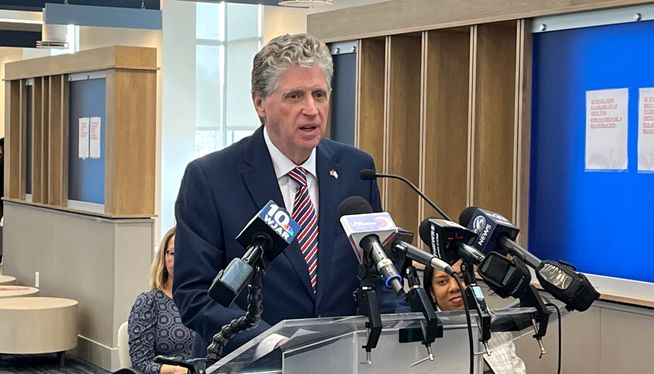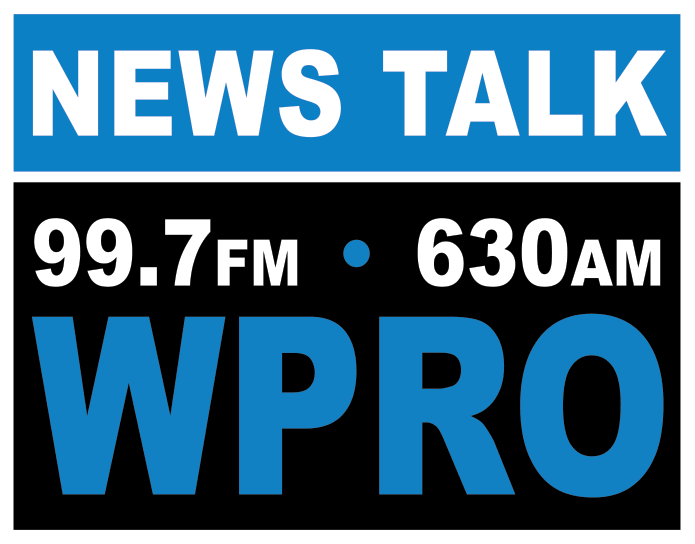
WPRO News and The Associated Press
The McKee administration Thursday outlined its plan for the state to restart Medicaid renewals, starting on April 1, in line with federal government requirements.
More than 20,000 people may lose coverage of the 350,000 Rhode Islanders currently covered by Medicaid, while nationally, as many as 14 million people could lose access to coverage of the roughly 84 million people now enrolled in the government-sponsored program.
Rhode Island is planning an extensive process, known as eligibility redetermination, enrollees will receive a letter and email from the state outlining the steps toward renewal. Initial steps call for updating personal information. This can be done through a managed care organization, in-person at state Department of Human Services offices, by calling HealthSource Rhode Island at 1-855-840-4774, or online at healthyrhode.ri.gov or staycovered.ri.gov
Families with children will not have to start their renewal process until December.
The Associated Press recently published an article with more details about the process:
WASHINGTON (AP) — If you get health care coverage through Medicaid, you might be at risk of losing that coverage over the next year.
Roughly 84 million people are covered by the government-sponsored program, which has grown by 20 million people since January 2020, just before the COVID-19 pandemic hit.
But as states begin checking everyone’s eligibility for Medicaid for the first time in three years, as many as 14 million people could lose access to that health care coverage.
A look at why so many people may no longer qualify for the Medicaid program over the next year and what you need to know if you’re one of those people who relies on the program.
WHAT’S HAPPENING TO MEDICAID?
At the beginning of the pandemic, the federal government prohibited states from kicking people off Medicaid, even if they were no longer eligible. Before the pandemic, people would regularly lose their Medicaid coverage if they started making too much money to qualify for the program, gained health care coverage through their employer or moved into a new state.
That all stopped once COVID-19 started spreading across the country.
Over the next year, states will be required to start checking the eligibility again of every person who is on Medicaid. People will have to fill out forms to verify their personal information, including address, income and household size.
WHEN MIGHT I LOSE MY COVERAGE?
That will vary depending on which state you live in; some states are moving faster than others to check eligibility. Arizona, Arkansas, Florida, Idaho, Iowa, New Hampshire, Ohio, Oklahoma and West Virginia are among the states that will begin removing ineligible Medicaid recipients as early as April.
Other states will start taking that step in May, June or July.
Not everyone will be removed from the program all at once. States plan to verify all recipients’ eligibility over periods of nine months to one year.
HOW WILL I BE NOTIFIED IF I’M LOSING COVERAGE?
If you rely on Medicaid for care, it’s important to update your contact information, including home address, phone number and email with the state from which you receive benefits.
States will mail a renewal form to your home. The federal government also requires states to contact you in another way -– by phone, text message or email –- to remind you to fill out the form.
Even if mailed notices reach the right address, they can be set aside and forgotten, said Kate McEvoy, executive director of the nonprofit National Association of Medicaid Directors.
“A text might just grab someone’s attention in a way that would be more accessible,” she said, noting that a quick message also may be less intimidating than a mailed notice.
Most states have already used texting for things such as reminding patients to get a COVID-19 vaccine or about upcoming doctor’s visits. But sending mass texts on Medicaid eligibility will be new, McEvoy said.
You will have at least 30 days to fill out the form. If you do not fill out the form, states will be able to remove you from Medicaid.
WHAT ARE MY OPTIONS IF I’M KICKED OFF MEDICAID?
Many people who will no longer qualify for Medicaid coverage can turn to the Affordable Care Act’s marketplace for coverage, where they’ll find health care coverage options that may cost less than $10 a month.
But the coverage available on the marketplace will still be vastly different from what’s offered through Medicaid. Out-of-pocket expenses and co-pays are often higher. Also, people will need to check if the insurance plans offered through the marketplace will still cover their doctors.
A special enrollment period for people who are unenrolled from Medicaid will start March 31 and last through July 31, 2024. People who lose Medicaid coverage can submit an application at any time during that period after losing coverage and will have up to 60 days to select their plans, according to guidance the Centers for Medicare and Medicaid Services sent to states last month.
MY CHILDREN ARE ENROLLED IN MEDICAID. WHAT WILL HAPPEN TO THEIR COVERAGE?
More than half of U.S. children receive health care coverage through Medicaid or the Children’s Health Insurance Program.
Even if you receive a notice that you’re no longer eligible for Medicaid, it’s likely that your child still qualifies for the program or for health care coverage through CHIP, which covers children whose families make too much money qualify for Medicaid but don’t earn enough to afford private health insurance.
Between 80% and 90% percent of children will still be eligible for those programs, according to estimates from the Georgetown University Health Policy Institute’s Center for Children and Families.
“When a parent receives a message that they aren’t eligible anymore, they often assume their child is no longer eligible either,” said Joan Alker, the center’s executive director. “It’s more common to find that the parent is no longer eligible for Medicaid, but the child still is.”













